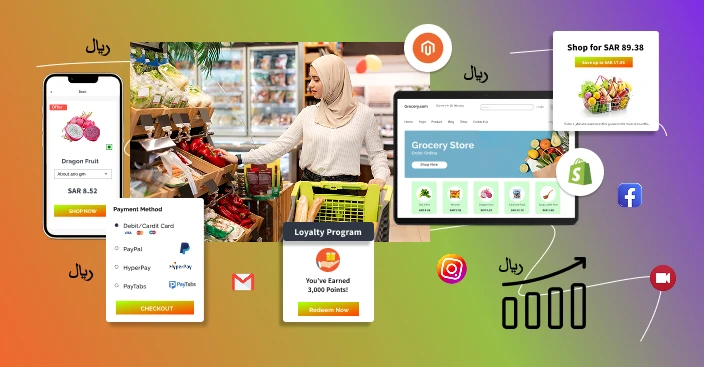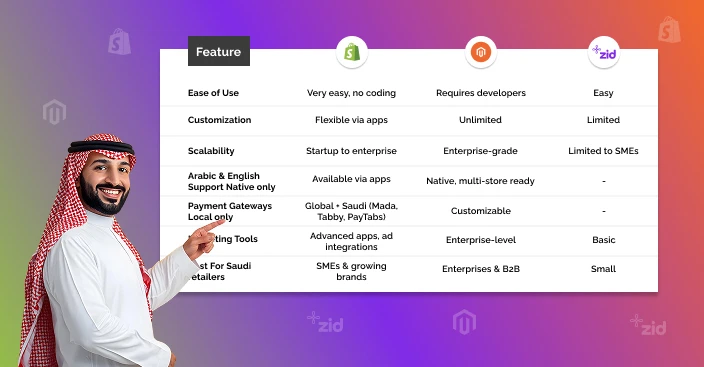Shopify vs Magento vs Zid: Choose The Best Option for Your Saudi Brand

Table of Contents
The growing eCommerce need for Saudi Arabia’s market is the demand for the right platform to cater to Saudi Arabia’s Vision 2030. Now, the customers have become more aware and demanding of getting a better, digitally aligned buyer experience.
To ensure this, the brands from Riyadh, Jeddah, Dammam, and all over Saudi Arabia are looking for innovative tools and platforms to deal with the critical business needs.
And when the companies come back looking for the solution, three choices are considered: Shopify, Magento (Adobe Commerce), and Zid.
Zid, being local and an Arabic-first solution for small businesses, still suffers the issue of scaling, customization, and maturity that any global platform would offer. This is more so when you consider how fast Shopify Saudi startups grow.
For Saudi Arabian businesses that want to scale up, Shopify and Magento are no-brainer, safe bets with international features, top-notch integrations, and future-proofed solutions to be offered by local players.
This blog will find out the best platform for Middle East brands to expand without any hurdles. Will will compare the top three eCommerce platforms, including Shopify, Magento, and ZID, and also understand if the global platforms are effective or the local platforms.
Why Shopify is Better Than Over Zid
Global Trust, Local Agility
Shopify powers millions of stores globally and is natively linked with Saudi payment gateways, including Mada, PayTabs, Tabby, and HyperPay. This mix of global trust and local adaptability is advantageous for Saudi retailers. Based on the recent study, it was found that in 2025, Shopify held a 9.43% share of the total online stores in Saudi Arabia.
Pro Storefronts & Customer Experience
Saudi customers need advanced, mobile-driven shopping experiences. Shopify has hundreds of mobile-optimised and conversion themes, while Zid provides simple templates that may constrain brand identity and professional looks.
Scalability
Zid suits small shops, while Shopify expands from startups to high-volume stores using Shopify Plus. It accommodates thousands of SKUs, intense traffic, and global scaling and thus is ideal for committed Saudi brands.
Marketing & Sales Tools
Shopify can capitalise on over 8,000 apps, including running marketing campaigns from Google, Meta, TikTok, and Snapchat. Zid does not have sufficient mechanisms of marketing tools, especially for companies that ought to be brought to locals and the global public.
Why Magento is Better Than Zid
Enterprise-Class Power
Magento has become trusted by the very largest international and Saudi corporations. Being a rock-solid architecture, it is preferred by B2B companies, big retail chains, and, in particular, government-backed startups based out of Riyadh and Jeddah needing a scalable Magento store, while Zid is basically built for SMEs.
Unlimited Customisation
Companies are free to customise workflows, catalogues, and checkout pathways to suit intricate business needs through Magento. Zid lacks a lot of features, which deter long-term expansion prospects.
Multi-Language & Multi-Store Capabilities
Saudi businesses prefer to sell to English- and Arabic-speaking clients. Multi-store installations are easy with Magento, but Zid lacks sophisticated bilingual and multi-store capabilities.
Enhanced B2B & Omnichannel Capability
Magento is better in B2B pricing, sophisticated product management, and omnichannel commerce. Saudi businesses planning regional and global expansion strategies cannot be executed by the current level of maturity in Zid.

Zid: A Good Start, But Restricted
Zid plays a crucial role in enabling small businesses to take the eCommerce path. Zid can be combined with Saudi delivery companies and payment gateways, thereby allowing online stores to be easily opened by entrepreneurs.
With time, though, as businesses expand, Zid’s enterprise limitations, ad options, and customisation limit it to Shopify and Magento capacity. A recent report says Zid stores decreased 0.4% quarter-over-quarter in 2025 Q2, due to it’s limitations on flexibility.
Shopify vs Magento: What Do You Need to Know
- Shopify: While Shopify expert services are effectively aligned with Riyadh, Jeddah, or Dammam small and medium enterprises and start-ups, as it requires quick installation, simplicity, and marketing features to establish and develop their web shop.
- Magento: Best suited to B2B firms and large-scale enterprise companies that require scalable workflows, multi-store setup, and enterprise-level scalability.
- Zid: Best suited to small shops or new retail firms, but future expansion plans underway outweigh the capabilities of the platform.
Quick Comparison: Shopify, Magento, and Zid
| Feature | Shopify | Magento | Zid |
| Ease of Use | Very easy, no coding needed | Requires Magento experts | Easy |
| Customisation | Flexible through apps | Unlimited | Limited |
| Scalability | Suitable for startups to enterprises | Enterprise-grade | Limited to SMEs |
| Arabic & English Support | Available via apps | Native, multi-store ready | Native only |
| Payment Gateways | International + Saudi (Mada, Tabby, PayTabs) | Fully customisable | Local only |
| Marketing Tools | Advanced apps & ad integrations | Enterprise-level tools | Basic |
| Best For | SMEs & new brands | B2B & large companies | Small Saudi retailers |
Shopify Success Story
Beauti – Luxury Beauty Retailer
Beauti, a Saudi Arabia-based luxury beauty retailer, originally began selling online via Zid. Despite Zid doing its utmost in launching them with localised payment features and Arabic deployment, the platform couldn’t cope with traffic growth, variant products, and sophisticated marketing needs.
Shifting to Shopify Plus helped Beauti experience a mobile-optimised site, payment consolidation with Saudi and foreign payment gateways such as Mada and PayTabs, and advanced email, SMS, and social media marketing features.
Half a year went by, and the retailer had gained 50% online sales and site performance, thereby making it feasible for them to enter Saudi Arabia and gain a foothold in the GCC markets—a step Zid could not quite achieve.

Magento Success Story
IndustrialTools
IndustrialTools.sa is a major Saudi Arabian supplier of industrial equipment, tools, and machinery that provides both B2B and B2C services.
Initially, they start with the Zid platform for their store development and management. However, they were facing inconvenience with the platform, including payment processing, campaign management, and limited features for sales.
They were looking to boost their business growth and, therefore, wanted to switch to Adobe-Commerce (Magento), which offered them comprehensive B2B features with SAP integration and automated workflows.
The outcome was a good one with a 70% reduction in time with regard to processing orders, increased scalability, and a platform flexible enough to keep pace with their growing organisational requirements, making their digital journey a grand success!
Conclusion
While Zid is assisting most Saudi businesspeople to set up their web presence, Shopify and Magento obviously have more advanced, scalable, and future-proofed options.
The key feature that sets Shopify apart for small and medium companies is instant setup of the store, pro-level store features, and marketing capabilities. As such, it is ideal for retail companies who want to stay one step ahead of retail trends.
Magento is ideally suited for large corporations that need unlimited flexibility, complex workflows, and multi-store capabilities.
For Riyadh, Jeddah, Dammam, and Saudi Arabia business commerce companies, Shopify or Magento would be a suitable choice against Zid, a platform which will grow as big as their imagination, can deal with heavy traffic, and provide world-class shopping experiences.
In short, for long-term success in the Saudi Arabian eCommerce competitive arena, Shopify and Magento are suitable choices against Zid in nearly every aspect.
Talk to an expert to understand the right platform based on your unique business needs.
FAQs
 What are the main differences between Shopify, Zid, and Magento?
What are the main differences between Shopify, Zid, and Magento?
Shopify is a globally recognised SaaS-based eCommerce platform known for its ease of use, scalability, and extensive app store. This platform is mostly preferred by the brands that need a quick setup and minimal technical support.
Zid is designed specifically for the Middle East market. It is capable of delivering native Arabic support, local payment gateways, and regional regulatory compliance. Hence, the local business makes it an obvious choice for the region’s SMEs.
In contrast to Shopify and Zid, Magento (Adobe Commerce) is a highly customisable, open-source platform that is geared towards corporations. It provides full flexibility in the design, features, and integrations, which makes it the enterprise favourite when they have advanced or complex eCommerce requirements.
 Which of these three platforms is safe for online payment processing?
Which of these three platforms is safe for online payment processing?
- Shopify: PCI-DSS compliant, with SSL certificates and built-in fraud analysis, thus very secure for online payment processing.
- Zid: Supports secure Middle Eastern payment gateways and local security requirements, providing secure transactions for Middle Eastern businesses.
- Magento: Provides enterprise-level security with user-controllable security patches and regular updates but is technical in nature to implement and provide further security.
 Which one is cheaper to construct: a Magento store or a Shopify store?
Which one is cheaper to construct: a Magento store or a Shopify store?
- Shopify is cost-effective for medium and small businesses with fixed fees and minimal technical deployment.
- Magento 2 and Salla, whilst presenting different strengths, cater to different business needs. Magento is more sophisticated and adaptable and thus costlier to develop and maintain. Accordingly, it finds application in big businesses that require advanced features and customized solutions.
 Which platform is better suited to Shopify vs. Zid vs. Magento?
Which platform is better suited to Shopify vs. Zid vs. Magento?
- Shopify: This platform will be good for any brand looking to expand and grow fast with scalability with high-end features.
- Zid: This platform is effective but only for local Middle East customers.
- Magento: This platform is highly useful for high-growth brands that help to maximise flexibility, multi-store capability, and advanced customisation.
 Which is most appropriate for Arabic and English websites?
Which is most appropriate for Arabic and English websites?
Both Magento are fully bilingual and multi-store, whereas the Arabic ones of Shopify exist as apps. Zid is mainly oriented towards the Arabic community with minimal bilingual capabilities.




